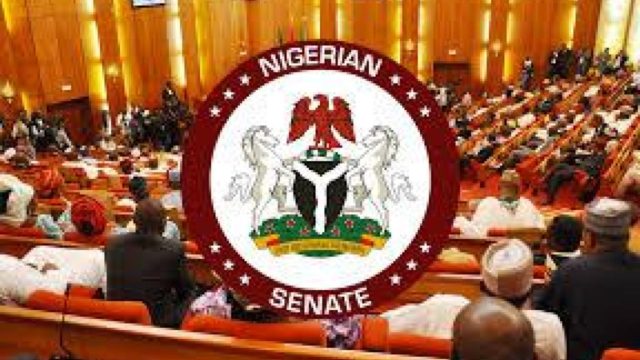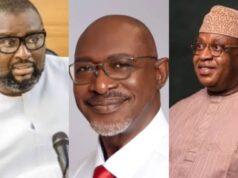 THE rising debt profile of Nigeria on yearly basis came to the front burner as Senators yesterday began debate on the general principles of the 2019 Appropriation Bill of N8.83 trillion presented before the National Assembly by President Muhammadu Buhari.
THE rising debt profile of Nigeria on yearly basis came to the front burner as Senators yesterday began debate on the general principles of the 2019 Appropriation Bill of N8.83 trillion presented before the National Assembly by President Muhammadu Buhari.
Senators who raised the alarm over the increasing debt profile which if not checked, would put the generation unborn in very great danger, however called on the government to put caution above everything.
According it them, if serious caution was not taken, it would return the country back to a highly indebted one that Nigeria as a country experienced prior to the 2005 debt relief granted it by the Paris Club.
Debate on the Appropriation Bill by the Senators kicked off soon after the Senate Majority leader, Senator Ahmad Lawan, All Progressives Congress, APC presented the lead debate of the figures of the budget and its objectives.
In his remarks, Senate Deputy President, Senator Ike Ekweremadu, PDP, Enugu West who first raised the alarm on the increasing debt profile of the country, said that though the budget proposals have to be given expeditious consideration and passage in view of enormous time already lost on the bill, but its borrowing plans must be scrutinized to prevent the country from exceeding its limit when juxtaposed with the ratio of Gross Domestic Product ( GDP).
Ekweremadu who said that time was already running out with regard to consideration and passage of the 2019 budget estimates, stressed however that the increasing borrowing proposals cum plans on yearly budget was becoming unbearable.
Ekweremadu said, “The Senate Leader mentioned that borrowing is becoming increasingly unsustainable and we must be able to caution ourselves before we mortgage the future of our children. Some countries are already in danger including Indonesia because of the borrowing they had in the past. For every money you borrow, there must be a day for payment.
“We must therefore be cautious. Yes, it is important that we address our infrastructural needs through appropriate financing but I believe there are other creative ways of funding these infrastructures including Public Private Partnership and concessioning.
“For us to depend on borrowing means that we are putting our future in jeopardy. And therefore, it is time for us to ensure that our debt to GDP ratio must not exceed acceptable level.
“The other issue I will like to talk about is the budgetary cycle. Increasingly, we have deviated from the Financial Year proposed by the Constitution, which says in Section 318 that the Financial Year is the period of 12 months from 1st January of every year. Which means it is usually between the 1st of January and 31st of December or any other time as may be prescribed by the National Assembly.
“Over the last four years, the average period for which budget had been passed in this Assembly has always been in May. And I believe it is a very dangerous trend. We must have to go back to the Financial Year prescribed by the Constitution.
“The implication of what is happening now is that the Executive consistently has brought the budget quite late, usually towards the end of December or shortly before we leave on break in December. And that makes it impossible for the National Assembly to consider this until sometime into January. And this year it is even going worse because we had to go into election. So, the implication is that budget will be delayed, and even the implementation starts late. And when you pass budget in May, for instance, you are passing just at the verge of the raining season. And Nigeria is a developing country. We need a lot of infrastructural development which can only take place during the dry season.
“If we must adjust the financial period as provided by the Constitution, we need to adjust it backwards to start in September so that the whole of dry season from October to April can be utilised. But for us to move our Financial Year from January to May, I believe that it is not good for our development and we must do everything possible.
“As we go into the next Assembly, I believe that it is something we need to address between the Executive and the Parliament to ensure we descipline ourselves regarding the time to prepare the budget, present and consider it.
“Now we know that there will be budget next year. I expect the Executive to start preparation of this budget early enough so that latest by September, that budget would have come. And we will have month or two to do with it so that the implementation will start early during the dry season.
“Now that we are just out of elections, the budget may have its own shortcomings, it may have some mistakes, distortions. But I think that the best we can do for this country at this moment is to pass this budget expeditiously. What I recommend therefore is that as soon as we are able to send it to our committee, they need to meet with the relevant agencies, cross the t’s and dot the i’s and quickly return it. No matter the imperfections. Because this budget is not just about us or the Executive. It is all about Nigerians out there who want water, electricity, roads and other infrastructure. It is about our staff who want to be paid salaries. It is about our commitment to the international community. So we need to do whatever we can, showing some level of patriotism to ensure that this is passed no matter the imperfections because we are running out of time already so that implementation of the budget will start in earnest.”
In his contribution, Senator Dino Melaye, PDP, Kogi West who gave statistics on the rising debts profile, said that the debt profile of the country now is $60 billion from less than $20billion it was before the present government came on board in 2015, just as he said that Nigerians and the lawmakers must feel sorry about the budget.
Melaye who noted that components of the $60 billion debts profile are $23billion as external debt, $20billion as local debts while $12 billion is already being proposed for financing of Port Harcourt to Maiduguri Rail lines, said, “Nigeria is gradually turning to a chartered borrowing Nation under this government all in the nane of funding infrastructure. This must be stopped because the future of the country and in particular, lives of generations yet unborn are being put in danger.”
According to Senator Melaye, Inspite of the high level of indebtedness of the country, the All Progressives Congress, APC led government was planning to further devalue the Naira to about N500 to a US dollar and that the Nigeria Stock market suffered a misfortune of N300billion loss two weeks ago when President Muhammadu Buhari got reelected .
He said, “Inflation is on the rise, unemployment rate is increasing , assumptions made for the budget estimates as regards $60 oil price benchmark and 2.3million barrel oil production level per day are unrealisable and unrealistic.”
On their part, Senators Shehu Sani, PRP, Kaduna Central, Albert Akpan Bassey ( PDP Akwa Ibom North East ) etc, also called for caution on the part of the executive on the rising debts profile of the country.
In his contribution, Senator Andrew Uchendu, APC, Rivers East who noted that the benchmarks of 60 dollars/barrel and daily production output of 2.3 million barrels/day were unrealistic, however called for reduction of the figures.
He said, “The 60 dollars/barrel benchmark seems unrealisable because the international price as we speak, is around 50 dollars per barrel. Again, our budgets have always been based on 2.3 million barrels per day, but this has not been realised over the years. It will make more sense to reduce the figures so that we gave a more realistic projections.”
Senator Uchendu also urged the Federal Government to replicate the successes recorded in rice production in other products like oil palm, for which the country has comparative advantage to boost non-oil revenues.
But on their parts, Senators Gbenga Ashafa ( APC Lagos East), Adamu Aliero ( APC Kebbi Central), Jibrin Barau ( APC Kano North) and Deputy Senate Leader, Bala Ibn Na’Allah ( APC Kebbi South) defended the debt profile, saying that it was not as outrageous as being portrayed by those raising the alarm.
In his contribution, Senator Na’Allah said that rather than say that Nigeria was over borrowing, the country was grossly under borrowing when the total amount borrowed is juxtaposed with her population and resources both human and capital .
When it was time for him to speak, former Senate Leader, Senator Mohammed Ali Ndume, APC Borno South had moved a motion for the budget to pass for second reading yesterday because according to him, time was not on their side, but the Senate President, Bukola Saraki ruled that the debate should continue and end next week Tuesday.
Source: Vangard NG








This APC- led government want to put us in serious debt that will be difficult to get out.